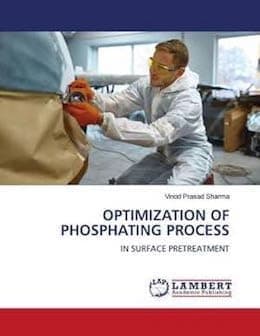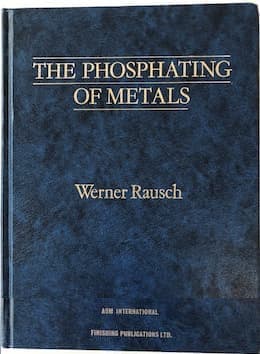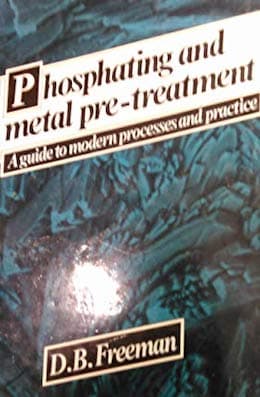
Curated with aloha by
Ted Mooney, P.E. RET

The authoritative public forum
for Metal Finishing 1989-2025

-----
Black zinc phosphate Q&A, Problems & Solutions
Q. I am doing zinc phosphate (black finish) on drywall screws, after pickling we do black by immersion in chemical after that we do zinc phosphate, I am facing the problem of black impression. Parameters of zinc phosphate are well in range according to TDS. Please suggest.
Sanjay Dhadwal- Dubai, UAE
September 19, 2024
? Hi Sanjay.
Sorry, but I do not understand what you mean by "the problem of black impression".
Making the zinc phosphate to be black usually involves an antimony compound.
More words please, and hopefully some pictures of the defect. Thanks!
Luck & Regards,

Ted Mooney, P.E. RET
Striving to live Aloha
finishing.com - Pine Beach, New Jersey
Q. Dear All,
We are doing zinc phosphate Grey Finish) on screws. Please suggest the post dip after zinc phosphate to achieve black finish.
Thanks!
- Dubai, UAE
December 27, 2024
A. Hi again, Sanjay.
I believe that black phosphate is achieved by the addition of an antimony compound like antimony trichloride. Strangely, it seems that this blackening treatment can be a pre-dip before phosphating, or can be incorporated in the phosphating tank, or can be a post-dip after phosphating.
I do not know which of the 3 points is most common or "best", but I don't think attempting to use a generic mix is best, but rather to select a reputable process supplier and rely on their chemistry. You might also talk to a supplier of cold black oxide processes; I have heard that the selenium-based cold black oxides can be an alternate post-dip to darken zinc phosphate coatings.
Luck & Regards,

Ted Mooney, P.E. RET
Striving to live Aloha
finishing.com - Pine Beach, New Jersey
Q. I am interested in finding out if doing a black zinc chromate treatment on a zinc phosphated carbon steel surface is a sensible or even viable way of blackening steel that is corrosion resistant. What are the pitfalls in doing such a process, and would the final surface need to be sealed with oil or wax?
Ralph DiVito- Indianapolis, Indiana
December 13, 2024
A. Hi Ralph,
In my estimation this would not work. Both phosphates and chromates are conversion coatings which react with the base metal to form new compounds. Once the surface has been phosphated, the chromate will not react with it.
Phosphated surfaces are not highly corrosion resistant; rather they are primarily intended either as a base for paint or to operate in or with oil.
Please try to describe the application because abstract questions are tough to answer without lots of ifs-ands-&-buts ... but in the meanwhile, zinc electroplating plating followed by black trivalent chromating may be a viable solution.
Luck & Regards,

Ted Mooney, P.E. RET
Striving to live Aloha
finishing.com - Pine Beach, New Jersey
⇩ Related postings, oldest first ⇩
Q. One of our clients is asking us to zinc phosphate some steel parts. We currently have one line in operation and the color we obtain is dark gray. This customer is asking for a very intense black color and none of our suppliers have been able to tell us how to obtain it. They only say that it might be manganese phosphate instead of the zinc we are asked for.
Reading the MF directory I found that phosphate can be colored using a special coloring agent. Does anyone know what these agents are, or how to obtain a black zinc phosphate?
Thanks in advance
Guillermo Luna- Mexico City, Mexico
1997

avail from AbeBooks, or Amazon

avail from eBay, AbeBooks, or Amazon

avail from eBay, AbeBooks, or Amazon
(as an Amazon Associate & eBay Partner, we earn from qualifying purchases)
A. Mr. Luna,
There are ways to chemically blacken zinc phosphate coatings. Several companies sell proprietary products to do that. Lots of fasteners receive a blackened zinc phosphate plus a rust inhibiting oil or wax. I'm not an expert in this process but you should be able find one below. Hope this helps!
Heatbath
Parker-Amchem (Henkel Surface Technologies)
Oakite Products, Inc. (Chemetall)

Jeff Watson
- Pearland, Texas
A. To answer your question, the missing link is Antimony Trichloride, a blackener that is used after zinc phosphate to darken the grey color to black.
Jeff is right though, you will need to seal the zinc phosphate and blackener with a rust preventative oil or coating of some sort in order to retain the black color.

Craig Burkart
- Naperville, Illinois
A. Zinc phosphate coatings are very porous coatings. The blackening you require can be accomplished in standard zinc phosphate process with the addition of an another tank to provide the black coating you desire. Rather than standard sealing with chrome or a suitable non chrome alternative, an oil emulsion is usually used.
Most proprietary zinc phosphate manufactures have the products you require.
Good luck
Dan ZinmanA. I read on another website that if you give your parts a black oxide treatment before the phosphate dip, it looks like a manganese phosphate appearance, though I do not know firsthand.
Mike VanOuseA. The customer asked for the intense black color phosphate deposit coating. That may imply that the phosphate coating itself should be black, chemically active, natural, and available to paint or wax. If so, you may solve the puzzle with a particular formulation of phosphatizer.
Jun Q. Zhang- Cincinnati, Ohio
Q. Dear sir
I am student of M .PHIL CHEMISTRY my research is on black zinc phosphating sir. I want to get some literature about it and particularly about its chemicals sir. If you are in this position kindly send me the required information and oblige.
thanks,
student - Pakistan
2005
A. Dear Ahsan Amin Bhatti,
The following article might be of some help to your work.
Guangyu Li, Liyuan Niu, Jianshe Lian and Zhonghao Jiang,
A black phosphate coating for C1008 steel
Surface and Coatings Technology
Volume 176, Issue 2 , 1 January 2004, Pages 215-221

T.S.N. Sankara Narayanan
- Chennai, Tamilnadu, India
(ed.note: The good doctor offers a fascinating blog, "Advancement in Science" )
Is black phosphate coating environmentally friendly?
Q. Is black phosphate coating environment friendly? Does it contain prohibited materials such as lead, mercury, cadmium, hexavalent chromium, polybrominated biphenyls, or polybrominated diphenyl ethers?
Yosinori Isiielectronics mfgr - Plymouth, Michigan
2005
A. Yosinori Isii,
Black phosphate coating is obtained by post-treatment of Zinc phosphate coating in solutions containing Antimony salt (Antimony trichloride), a blackening agent to darken the grey color to black.
Toxicology of Antimony trichloride.
Harmful by ingestion, inhalation or through skin contact. Corrosive - causes serious burns. Mutagenic effects have been observed with bacteria. Reproductive effects have been observed in tests with laboratory animals.
The zinc phosphating process normally involves a chromic acid sealing stage to seal the pores of the phosphate coating. Cr(VI) is toxic and is being phased out.
Phosphating process is normally free from polybrominated biphenyls, or polybrominated diphenyl ethers
The chances for Pb, Cd and Hg depends on the purity of chemicals used in the various stages of the phosphating process.

T.S.N. Sankara Narayanan
- Chennai, Tamilnadu, India
(ed.note: The good doctor offers a fascinating blog, "Advancement in Science" )
Q. Mr Shankar Narayan. I read your review paper on phosphating... Impressive. You mentioned that the post chromic acid rinse creates predominantly a mix of Cr(III) oxide and hydroxide which is about 88% and probably about 12 % of Cr(VI)oxide. Can you please quantify what is the equivalent weight or thickness percentage of Cr(VI) oxide present in the phosphated layer.
Debashis Duttaaerospace systems - Bangalore, Karnataka, India
July 4, 2014
A. Hi Dutta,
I don't know how to quantify the Cr(VI) in phosphating post treatment layer.
But some proprietary zinc phosphating post treatment chemical (i.e., Engineering (Cr VI free) Passivation) are available nowadays which are eco-friendly.
Regards,
Process Engineer - Tumkur , Karnataka, INDIA.
A. The thickness of the chromate sealing should be of the order of nanometers. The effectiveness of corrosion protection by chromate treatment stems from the sealing of the pores and the nature of the chemical compounds.

T.S.N. Sankara Narayanan
- Chennai, Tamilnadu, India
(ed.note: The good doctor offers a fascinating blog, "Advancement in Science" )
Q. God bless you all there,
I understand after reading the upper discussion, that if we want black phosphate coating, then we'll follow this process line,
Pretreatment
Zinc phosphate coating
Blacking agent may be antimony trichloride
Now please tell me how to use antimony trichloride solution, that's parameters, solution making etc,
Please give response, because I'm waiting for this information,
Five star e'plating - Lahore Pakistan
August 16, 2017
Q, A, or Comment on THIS thread -or- Start a NEW Thread